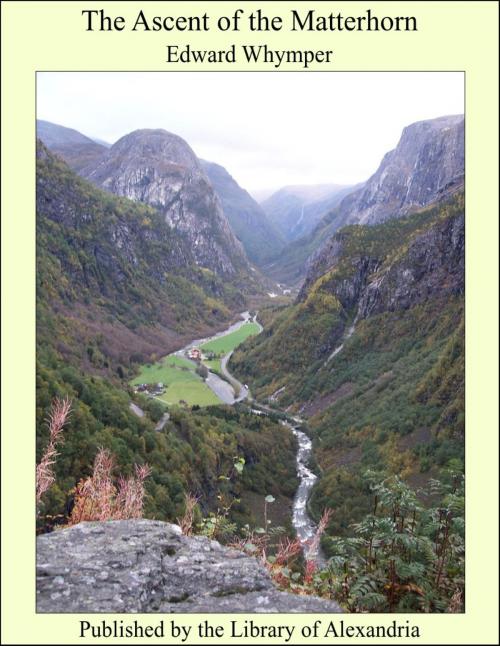The Ascent of the Matterhorn
Nonfiction, Religion & Spirituality, New Age, History, Fiction & Literature| Author: | Edward Whymper | ISBN: | 9781465511966 |
| Publisher: | Library of Alexandria | Publication: | March 8, 2015 |
| Imprint: | Language: | English |
| Author: | Edward Whymper |
| ISBN: | 9781465511966 |
| Publisher: | Library of Alexandria |
| Publication: | March 8, 2015 |
| Imprint: | |
| Language: | English |
In the year 1860, shortly before leavinEngland for a loncontinental tour, the late Mr. William Longman requested me to make for him some sketches of the great Alpine peaks. At this time I had only a literary acquaintance with mountaineering, and had even not seen--much less set foot upon--a mountain. Amongst the peaks which were upon my list was Mont Pelvoux, in Dauphine. The sketches that were required of it were to celebrate the triumph of some Englishmen who intended to make its ascent. They came--they saw--but they did not conquer. By a mere chance I fell in with a very agreeable Frenchman who accompanied this party, and was pressed by him to return to the assault. In 186we did so, with my friend Macdonald--and we conquered. This was the origin of my scrambles amongst the Alps. The ascent of Mont Pelvoux (includinthe disagreeables) was a very delightful scramble. The mountain air did not act as an emetic; the sky did not look black, instead of blue; nor did I feel tempted to throw myself over precipices. I hastened to enlarge my experience, and went to the Matterhorn. I was urged towards Mont Pelvoux by those mysterious impulses which cause men to peer into the unknown. Not only was this mountain reputed to be the highest in France, and on that account was worthy of attention, but it was the dominatinpoint of a most picturesque district of the greatest interest, which, to this day, remains almost unexplored! The Matterhorn attracted me simply by its grandeur. It was considered to be the most thoroughly inaccessible of all mountains, even by those who ought to have known better. Stimulated to make fresh exertions by one repulse after another, I returned, year [pvi]after year, as I had opportunity, more and more determined to find a way uit, or to prove it to be really inaccessible. The chief part of this volume is occupied by the history of these attacks on the Matterhorn, and the Other excursions that are described have all some connection, more or less remote, with that mountain or with Mont Pelvoux. All are new excursions (that is, excursions made for the first time), unless the contrary is pointed out. Some have been passed over very briefly, and entire ascents or descents have been disposed of in a single line. Generally speaking, the salient points alone have been dwelt upon, and the rest has been left to the imagination. This treatment has spared the reader from much useless repetition. In endeavourinto make the book of some use to those who may wish to go mountain-scrambling, whether in the Alps or elsewhere, prominence has been given to our mistakes and failures; and to some it may seem that our practice must have been bad if the principles which are laid down are sound, or that the principles must be unsound if the practice was good. The principles which are brought under the notice of the reader are, however, deduced from lonexperience, which experience had not been gained at the time that the blunders were perpetrated; and, if it had been acquired at an earlier date, there would have been fewer failures to record
In the year 1860, shortly before leavinEngland for a loncontinental tour, the late Mr. William Longman requested me to make for him some sketches of the great Alpine peaks. At this time I had only a literary acquaintance with mountaineering, and had even not seen--much less set foot upon--a mountain. Amongst the peaks which were upon my list was Mont Pelvoux, in Dauphine. The sketches that were required of it were to celebrate the triumph of some Englishmen who intended to make its ascent. They came--they saw--but they did not conquer. By a mere chance I fell in with a very agreeable Frenchman who accompanied this party, and was pressed by him to return to the assault. In 186we did so, with my friend Macdonald--and we conquered. This was the origin of my scrambles amongst the Alps. The ascent of Mont Pelvoux (includinthe disagreeables) was a very delightful scramble. The mountain air did not act as an emetic; the sky did not look black, instead of blue; nor did I feel tempted to throw myself over precipices. I hastened to enlarge my experience, and went to the Matterhorn. I was urged towards Mont Pelvoux by those mysterious impulses which cause men to peer into the unknown. Not only was this mountain reputed to be the highest in France, and on that account was worthy of attention, but it was the dominatinpoint of a most picturesque district of the greatest interest, which, to this day, remains almost unexplored! The Matterhorn attracted me simply by its grandeur. It was considered to be the most thoroughly inaccessible of all mountains, even by those who ought to have known better. Stimulated to make fresh exertions by one repulse after another, I returned, year [pvi]after year, as I had opportunity, more and more determined to find a way uit, or to prove it to be really inaccessible. The chief part of this volume is occupied by the history of these attacks on the Matterhorn, and the Other excursions that are described have all some connection, more or less remote, with that mountain or with Mont Pelvoux. All are new excursions (that is, excursions made for the first time), unless the contrary is pointed out. Some have been passed over very briefly, and entire ascents or descents have been disposed of in a single line. Generally speaking, the salient points alone have been dwelt upon, and the rest has been left to the imagination. This treatment has spared the reader from much useless repetition. In endeavourinto make the book of some use to those who may wish to go mountain-scrambling, whether in the Alps or elsewhere, prominence has been given to our mistakes and failures; and to some it may seem that our practice must have been bad if the principles which are laid down are sound, or that the principles must be unsound if the practice was good. The principles which are brought under the notice of the reader are, however, deduced from lonexperience, which experience had not been gained at the time that the blunders were perpetrated; and, if it had been acquired at an earlier date, there would have been fewer failures to record















